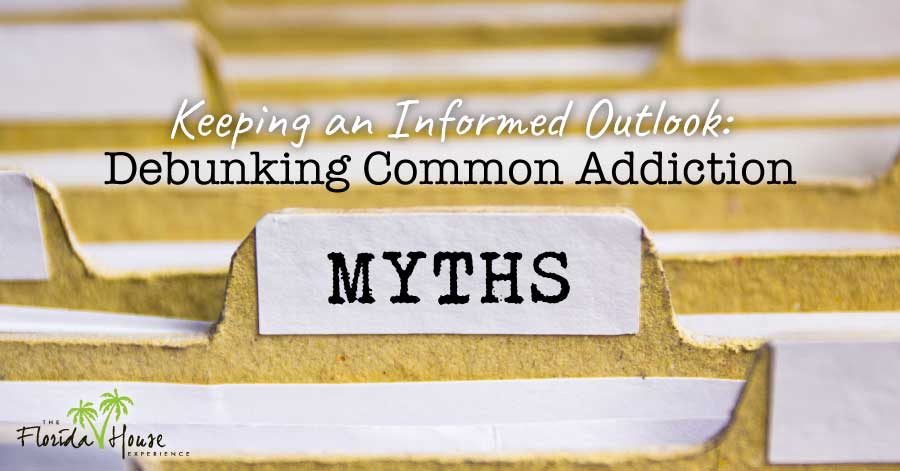
Historically, society hasn’t had a very firm understanding of addiction and many of the issues surrounding it, which has led to misguided theories and myths popping up around the topic. Some of these myths are dangerous, however, because they misrepresent the facts about addiction and addiction treatment.
Here are four common addiction myths and the reasoning behind why they’re not accurate:
Myth 1: Addiction Is Random
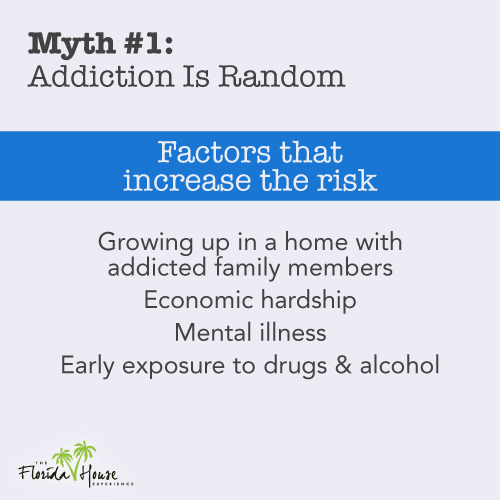 It’s true that addiction can happen to anyone, but it comes down to more than just random chance. There are risk factors that make some people more likely to abuse addictive substances than others.
It’s true that addiction can happen to anyone, but it comes down to more than just random chance. There are risk factors that make some people more likely to abuse addictive substances than others.
These risk factors include:
- Growing up in a home with addicted family members
- Economic hardship
- Mental illness
- Early exposure to drugs and alcohol
Another reason why one person might be more likely to find themselves struggling with addiction is simply brain chemistry. A British study carried out to research the risk factors of addiction performed tests on rats to measure impulsivity. The rats were then given a way to control their own intake of a solution containing trace amounts of cocaine over a period of time. The animals that were more impulsive based on prior testing showed a greater tendency to rely on the substance than those that were judged to be less impulsive.
Myth 2: Addiction Is Curable
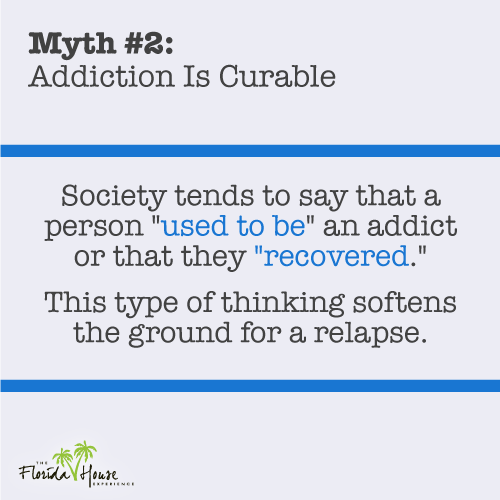 There’s a common misconception surrounding addiction, which is driven partly by the ways in which we talk about it. Society tends to say that a person “used to be” an addict or that they “recovered.” For members of the addiction treatment community, this is a dangerous way of thinking because it gives patients and their family members false expectations for the treatment offered.
There’s a common misconception surrounding addiction, which is driven partly by the ways in which we talk about it. Society tends to say that a person “used to be” an addict or that they “recovered.” For members of the addiction treatment community, this is a dangerous way of thinking because it gives patients and their family members false expectations for the treatment offered.
The fact is that recovery from addiction is a lifelong process because your body never returns to a state where you’re no longer affected by it. A relapse can happen a week after treatment, and it’s more likely during this time, but that overlooks the fact that relapse can also occur years removed from treatment, which is why it’s important to have a strong support system, even when you feel completely “recovered.”
Myth 3: An Addicted Person Absolutely Can’t Recover on Their Own
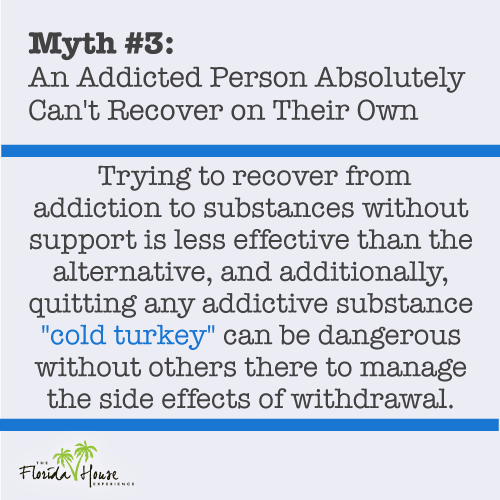 Is assistance always needed to recover from addiction? Not necessarily. Different people have had success recovering in many different ways. With this in mind, however, it’s well-documented that it’s still wisest to seek help. Trying to recover from addiction to drugs or alcohol without support is less effective than the alternative, and additionally, quitting any addictive substance “cold turkey” can be dangerous without others there to manage the side effects of withdrawal.
Is assistance always needed to recover from addiction? Not necessarily. Different people have had success recovering in many different ways. With this in mind, however, it’s well-documented that it’s still wisest to seek help. Trying to recover from addiction to drugs or alcohol without support is less effective than the alternative, and additionally, quitting any addictive substance “cold turkey” can be dangerous without others there to manage the side effects of withdrawal.
The National Institute on Drug Abuse (NIDA) has done extensive research on the safest and most effective methods of recovery, published in its Principles of Effective Treatment, a best practices guide for treatment providers and patients. Basically, what NIDA found is that the longer an addict engages with inpatient or outpatient treatment with specialists, the lower the relapse rate was after they completed the bulk of their treatment.
Myth 4: Addiction Is a Choice/Moral Defect
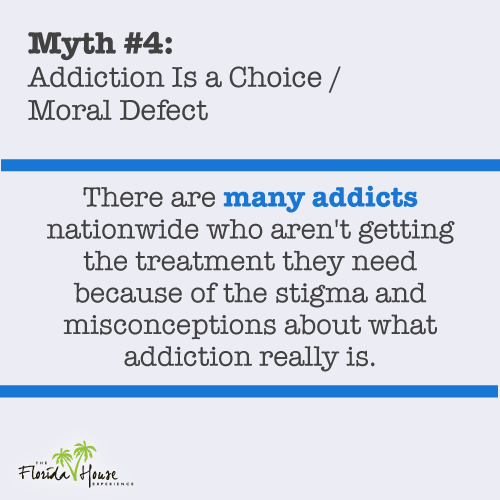 There are many addicts nationwide who aren’t getting the treatment they need because of the stigma and misconceptions about what addiction really is. Using drugs is a choice, but addiction is a disease that can and does happen to anyone. That’s why it’s so important to ensure that everyone has equal access to effective treatment geographically as well as economically.
There are many addicts nationwide who aren’t getting the treatment they need because of the stigma and misconceptions about what addiction really is. Using drugs is a choice, but addiction is a disease that can and does happen to anyone. That’s why it’s so important to ensure that everyone has equal access to effective treatment geographically as well as economically.
This myth has trickled down into so many institutions that deal with drugs in the United States, including:
Insurance: Historically, addicts have had a harder time getting treatment covered than for other chronic diseases.
Law enforcement: Drug offenders often face substantial penalties rather than treatment and rehabilitation.
Why Are These Myths Dangerous?
Anytime a topic is clouded by misinformation, misconceptions arise and damage the people and institutions that deal with that topic. In this case, addicts without accurate information may have a harder time finding effective help for their disease, and treatment facilities have a harder time providing effective treatment when the community is ill-informed about their purpose and value.
If you or a loved one want more information about addiction, reach out to FHE Health for answers.






